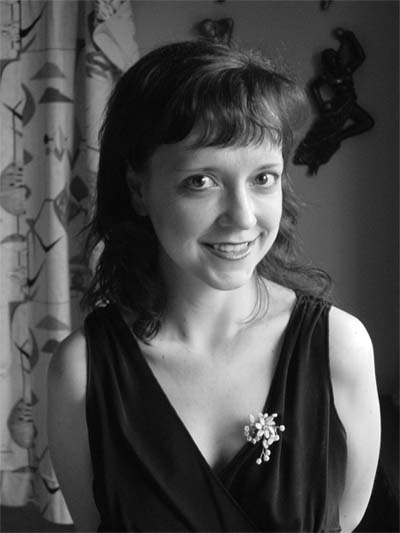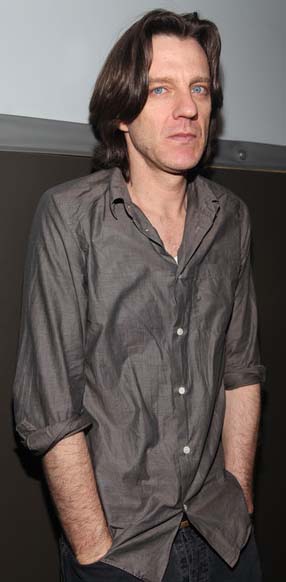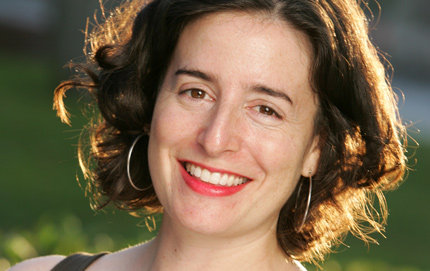Dana Spiotta appeared on The Bat Segundo Show #408. She is most recently the author of Stone Arabia.
Listen: Play in new window | Download
Spiotta previously appeared on The Bat Segundo Show #28. This particular conversation was recorded before a packed audience at McNally Jackson on July 20, 2011. My thanks to Michele Filgate and Katie Monaghan for their help in organizing this event.
For additional details about Stone Arabia, please also see our 25,000 word roundtable discussion: Part One, Part Two, Part Three, Part Four, and Part Five.
Condition of Mr. Segundo: Confusing dendrites with dandruff.
Author: Dana Spiotta
Subjects Discussed: Impostors within fiction, people with secret lives, double lives and triple lives, maintaining truth in fiction while avoiding obvious tricks, the role of the obstinate artist, work created to protect one’s self, avoiding obvious dichotomy, artists with exclusive audiences, familial obligation, relating to a character as a responder, the youthful longing in experiencing music, working in the dark while also being somewhat familiar with something, starting with a subject that you don’t really understand, enacting complexity, the frustration of reducing complexity through explanation, Susan Sontag’s “Regarding the Torture of Others,” the difficulty of being alive without leaving artifacts, being overwhelmed by information, taking in art as a full-time obligation, being saved by illusion, the Spiotta script style in Lightning Field and Stone Arabia, whether novelists should give up dialogue description, inventing memory techniques, keeping organizing principles coherent, shifting first-person and third-person to reflect consciousness, references to Stone Arabia, finding refuge in hyperarticulateness, memory and physical urgency, devotion and artistic evaluation, the pre-Facebook age, the appeal of selecting 2004 as a terrible year, commerce as a curating principle on the Internet, the illusion of endless amounts of information as liberation, retaining selfhood from a generational standpoint, Don DeLillo, and navigating influences.
EXCERPT FROM SHOW:
Correspondent: I have noticed that all of your novels are guided by having some impostor who is at the center of the narrative. And I’m curious if that notion of an impostor being sort of a prism with which to view American society or American culture — what is up with that? I mean, we’re now in an age where, thanks to the Internet, which aids and abets thousands of Don Quixotes that unleash every second — I mean, this is something that Cervantes could never have even seen in the early 17th century. What motivates your interest in impostors? Especially in this. And maybe we can use this to talk about the lovely Nik Worth, who is a wonderful impostor!
Spiotta: Okay. I don’t really — I think the word that I would use instead of “impostor” is people that have secret lives maybe. It’s another way of putting it. And I do see that in all three books there are people with secret lives. I mean, Nik Worth, the character in this book, he’s not trying to make it a secret. Nobody’s really that interested. But he’s definitely an eccentric person and has a double life to a certain extent. One: he has a fictional career and his actual life. And they are somewhat at odds with each other. And then, in other ways, they overlap. I mean, clearly, it’s something I’m interested in. But I think to a certain extent, we all have these double lives and triple lives. And the part of me who writes novels is separate from the part of me who’s speaking today. So I think that it’s an exaggerated version of what we do all the time. And certainly the Internet is amplifying that, sure.
Correspondent: Yes. But characters who hide in plain sight.
Spiotta: Right.
Correspondent: I think that might be a better way to identify this common theme.
Spiotta: Okay.
Correspondent: I mean, is this really the role of the 21st century novelist? I hesitate to use a term like “postrealist.” But it is interesting that there is this balance between what is real and what is fake. You have Casa Real. You have The Fakes — the band name in this. So it’s very pronounced here. And I’m wondering if a novelist today is almost obligated to respond to this Pandora’s box, so to speak.
Spiotta: Sure. I mean, yeah, of course. I always feel that I have, as I said, this kind of doubleness, which is natural for me. And maybe that’s because I sit in a room and I make up people. And that’s kind of a strange thing to do. So I imagine everybody does this. And maybe that’s not true. But I sort of think of everyone as having multiple selves. And this is just a more amplified version.
Correspodnent: “Versions of Me” — one of the songs that Nik Worth is actually responsible for. Nik’s Chronicles — there is in this book a very lengthy multi-volume set where Nik Worth, this character, is fabricating selves of all sorts. You have critics. He’s writing critical reviews of his own work. He is doing parodies and pastiches of his family members. I’m curious because there’s a lot of specific artistic and musical references within Nik’s Chronicles and also your book. The fake Denise letter that Denise reads at the very beginning is almost a trick on Denise. How do you write something this true without it seeming like a trick for the reader? I mean, are you thinking more in terms of how Denise is feeling? Because Denise is responding to these Chronicles.
Spiotta: Right. So that’s an interesting question because, in the book, there are — well, in the Chornicles, one character is writing and pretending to be another character. And then you’re reading that. And how does that not seem sort of manipulative and silly? And I think that the key is that there has to be a genuine — you have to inhabit that character inhabiting that other character. And you have to make Nik pretty good at what he does.
Correspondent: Yes. He’s very good.
Spiotta: He has to sort of be a novelist. So it’s just an extra layer. And so in a way, it comments on the whole idea of the artifice of creating a novel and a character. But mostly, I think it’s really about his affection for his sister and his poking her at the same time. So, so much about this book — what I really wanted the book to be was anchored in the emotional reality of a family and a brother and sister as they age. And the decisions that they made about themselves when they were 25, what does that feel 25 years later? So you have someone who says, “I want to be an artist. And I’m going to be an artist no matter what. And I don’t care if anybody likes my work.” And that’s easy to say when you’re nineteen. But then 25 years later, what does that look like? What does it feel like? And then what does it feel like for the people around you? So Nik is a kind of dramatic version of that. And he has this other layer of this invented life that he does for his amusement and, I think, to keep his sanity to a certain extent. To give him — so he makes up his own audience. He makes up his own response. He’s in dialogue with himself. So I wanted to pull that out and always keep it anchored in the emotional truth of a brother and sister, and the family.
Correspondent: Is the family really the best way to anchor that emotional truth? I mean, this also concerns memory. This concerns context. This concerns fact vs. fiction. Did everything originate from the family? How did these little side quests come about?
Spiotta: Okay. So what I envisioned for the book was to have it to be very intimate and claustrophobic. And sort of distorted by emotion and subjectivity. And to be this intimate thing. And I think, to the extent that a family — all these things tie back. Because one of the concerns of the book is how do you retain yourself in the face of, let’s say, all these things that want to annihilate you. And not just the Internet or information and all the things that come at you, but also that you’re aging and you’re watching your parents age and you’re eventually going to die. And all the things that we all have to deal with. How do you retain your sense of self? And part of it is your memory. And part of it is the things that you’ve created to protect yourself. Like Nik has his retreat, which is his way of protecting himself. But then also it’s the people in your life, who tell you who you are to a certain extent. And that can trap you. But it also can save you. And it’s both things at once. And I’m always interested in things being both. More than one thing. Not either/or. But this and this. And I don’t think of this as being ambivalent. I think of it as feeling strongly about things in two ways.
The Bat Segundo Show #408: Dana Spiotta II (Download MP3)




